- Home
- Lisa Graff
Sophie Simon Solves Them All Page 2
Sophie Simon Solves Them All Read online
Page 2
Too bad.
Daisy was snapped out of her thoughts by something poking into her left elbow. She turned to look.
At the desk next to her, Julia McGreevy was holding a folded-up square of paper.
“For Owen,” Julia whispered.
Julia McGreevy and Owen Luu were best friends. Julia sat at the desk to Daisy’s left, and Owen sat at the desk to Daisy’s right.
Daisy passed a lot of notes.
Today, though, Daisy thought about ignoring Julia. Note passing was against the rules. If Daisy got caught, it would mean no final recess for sure.
“Please?” Julia begged.
Daisy sighed and took the note.
But just as she was about to place it on Owen’s desk, Daisy sneezed.
When Daisy sneezed, she dropped things.
Daisy dropped the note.
Owen stuck his leg out to the side like a stretched-out dish towel, trying to cover up the note. But it was too late.
“Mister Luu!” Mr. St. Cupid shouted. “What are you doing?”
“I-I’m not d-doing anything,” Owen stuttered.
“Stop stuttering!” yelled Mr. St. Cupid. “Stuttering is not allowed in my class! New rule!”
Daisy gulped.
Mr. St. Cupid walked over to Owen’s desk and glared down at him. “Why is your leg stuck out like that?”
“Um…” Owen said. “I’m, um, stretching?”
“Well, it’s distracting!” Mr. St. Cupid bellowed. “From now on, stretching is not allowed in my class! New rule!”
Daisy grimaced.
“But I had a leg cramp,” Owen said.
“Leg cramps aren’t allowed in my class, either! That’s three checks for you, Mr. Luu! No final recess!”
Daisy gargled.
“O-okay,” Owen said. He slowly brought his leg back under his desk, pressing the note down hard into the carpet.
“Now,” Mr. St. Cupid said. He returned to the front of the classroom. “If I had five onions, and I ate three, what would— Mister Luu!” He pointed to Owen’s foot. “Is that a note?”
Daisy sucked in all her breath and puffed out her cheeks.
Owen’s face was red as a rib of rhubarb. “M-maybe?” he said.
“Hand it over!”
Daisy crossed her fingers.
Owen scooped the note off the floor. “I didn’t, um, write it,” he said as he gave it to the teacher.
Daisy crossed her toes.
“I d-don’t even know what it, um, says.”
Daisy crossed her eyes.
“Well,” Mr. St. Cupid said, “why don’t we all find out together then?” And he unfolded the paper and began to read aloud.
If Mr. St. Upid ate three onions, he’d be left with stinky breath.
“Class!” Mr. St. Cupid hollered. “Whoever wrote this note has broken a very serious rule.”
Daisy’s eyeballs were bulging from holding her breath too long.
“My name,” Mr. St. Cupid said, “is spelled like this.”
He wrote it on the board.
MR. ST. CUPID
“It has a C in it, class. St. Cupid. Not St. Upid.” He wrote that on the board, too.
MR. ST. UPID
“I simply cannot understand why my students continue to spell my name incorrectly every year. Rule number thirty-nine!” He pointed to the list:
No spelling anything rong
“Now!” Mr. St. Cupid shouted. “Let us return to math!”
Daisy returned to breathing.
“If I had five—”
Mr. St. Cupid stopped talking again as he passed in front of Daisy’s row. “What are you doing?” he bellowed.
He was looking directly at Daisy.
Daisy knocked three erasers out of her desk, which was against Rule number 77:
No dropping three things at once
But Mr. St. Cupid didn’t notice.
“Miss Simon!” he hollered.
He wasn’t hollering at Daisy.
He was hollering at Sophie Simon.
The teacher strode over to Sophie’s desk. “Miss Simon!” he shouted, spitting a little on the s’s. “Are you reading a book under your desk during math time?”
Sophie Simon always read books under her desk during math time. Daisy had been watching her do it all year. Sophie read books under her desk during science time, too. And during language arts time, and social studies time, and music time.
During silent reading time, she worked on chemistry experiments.
Sophie placed a finger in her book and looked up at Mr. St. Cupid. She showed him what she was reading.
“Principles of Civil Disobedience,” he read.
“Yes,” Sophie said. “It’s all about how, throughout history, people who were absolutely powerless”—Daisy’s ears perked up—“fought against authority by refusing to follow laws or rules they felt were utterly unfair.” Daisy sat up a little straighter in her desk. “Like in India in 1930,” Sophie went on, “when the government made buying salt illegal so a man named Gandhi led a march to the seashore to collect it. And in North Carolina in 1960, when African-Americans weren’t served at lunch counters because of their race, so they staged protests called ‘sit-ins.’ Or nowadays, when parents won’t buy their children graphing calculators, so the kids have to figure out how—”
Mr. St. Cupid slapped a hand on Sophie’s desk.
“Rule number sixty!” he shouted, pointing to the wall.
No reading books fatter than your head
“You will learn about history in high school!” Mr. St. Cupid bellowed at Sophie, plucking the book from her hands. “Third grade is for learning subtraction and tying your shoes!”
“But I already know those things,” Sophie said with a sigh.
“Rule number forty-five!” Mr. St. Cupid screeched at her. He pointed.
No sighing
“Three checks! No final recess for you, Miss Simon!”
And he tossed Sophie’s book in the garbage can.
As Mr. St. Cupid went back to hollering about onions, Daisy sat at her desk and thought.
Was it really true that powerless people could find a way to change their lives, like Sophie had said? Just by refusing to do something they didn’t think was fair?
Was all of that in the book Sophie had been reading?
Daisy stared at the garbage can.
Maybe, she thought, there was some hope for her after all.
“Miss Pete!”
Daisy looked up to see Mr. St. Cupid glaring down at her. His cheeks were puffed out like tomatoes.
“Why aren’t you paying attention?”
Daisy blinked. “I was just…” she said, “thinking.”
“Unacceptable!” Mr. St. Cupid shouted. “New rule!”
And he walked over to his list of rules and added a new one.
No thinking
Then he put a third check mark by Daisy’s name.
* * *
While everyone else was outside for final recess, Daisy and Owen were cleaning windows with squeegees.
Sophie was not cleaning windows with a squeegee.
She was reading her book from the garbage can.
“Sophie?” Daisy said.
Sophie did not look up.
Daisy tried again. “Can you help me with something?”
“No, thank you,” Sophie said, turning a page. “I’d rather not.”
Daisy looked over at Owen, but he was busy squeegeeing his window.
“I need your help,” Daisy told Sophie. “I need you to teach me about that civil disinfectant stuff.”
“Civil disobedience?” Sophie said.
“Yeah.” Daisy nodded. “I need to learn how to get out of my ballet recital tomorrow. Does it say anything about that in there?” She pointed to the book.
“No,” Sophie said.
She turned another page.
“Look,” Daisy told her, waving her squeegee in the air. “Haven’t you ever had a pr
oblem of your own?”
A blob of water flew off the squeegee and landed—PLOP!—at Sophie’s feet.
Sophie kept reading.
“A really really big problem?” Daisy went on.
Another two blobs flew off the squeegee and landed—PLOP! PLOP!—on Sophie’s head.
Sophie still kept reading.
“A problem so huge,” Daisy said, “that you thought there’d never be any way to solve it?”
Three more blobs landed—PLOP! PLOP! PLOP!—right in the middle of Sophie’s book.
Sophie Simon finally raised her head.
“I want a calculator,” she said. “A Pembo Q-60. It’s the very latest model. It costs one hundred dollars.”
Daisy thought that one hundred dollars sounded like an awful lot of money for a calculator. But she didn’t say that.
“I can help you get it,” she said instead. “If you get me out of my ballet recital.”
Sophie raised her eyebrows. “Do you have one hundred dollars?”
“No,” Daisy said. “I only have”—she added up all her saved allowance—“five. But I bet the other girls in my ballet class would chip in, too. No one wants to dance in the recital tomorrow. There are thirteen of us, and we could each give you five dollars. That’s enough, right?”
Sophie frowned at Daisy.
“If thirteen ballerinas each gave me five dollars,” she said, “I’d only have sixty-five.”
Daisy scratched her cheek. “So that’s not enough then?” she asked.
“I’d still need thirty-five more dollars for my calculator.”
From the window, Owen hiccuped.
“But you could help me anyway,” Daisy told her.
The bell rang for the end of final recess. Owen crossed the room to put away his squeegee.
“I don’t see why I should help you get out of your recital,” Sophie said, “if you can’t help me get a calculator.”
“But—”
“Anyway,” Sophie went on, “the principles of civil disobedience would never work in your case. You’d need someone from the newspaper to cover the story, and we couldn’t find anyone on such short notice.”
“The newspaper?” Daisy asked.
She didn’t know anyone who worked for a newspaper.
Sophie shrugged. “Sorry.”
And with that, she walked over to Mr. St. Cupid’s desk, tucked her book back in the garbage can under a slimy banana peel, and sat down at her desk.
Daisy sighed and walked to the suds bucket to put her squeegee back.
She slipped—SWISH!
And tripped—CLUNK!
And crashed—THUD!
“Rule number twenty-nine!” Mr. St. Cupid hollered as he entered the room. “No falling on your butt in the squeegee water!”
This, Daisy thought as she lay on her rear end in the middle of the classroom, was exactly why she needed to get out of that recital tomorrow.
But if Sophie wouldn’t help her, what could she do?
Piranhas and Pet Stores
Every afternoon, on the Number 17 bus coming home from school, Owen Luu sat in the exact same seat.
The second seat from the front, on the right side.
He always sat there with his best friend, Julia McGreevy. Julia didn’t care which seat she sat in, but it was very important to Owen.
The second seat on the right was the cleanest one on the whole bus.
It didn’t have dirt smears on the seat.
It didn’t have stuffing coming out of the bench.
It didn’t have gum underneath that your leg might stick to.
Owen hated dirty bus seats. They were grimy and messy and gross. Owen didn’t like being grimy and messy and gross. He was happiest when his clothes were ironed, his ears were washed, and his shoelaces were double-knotted.
But on Friday afternoon, as the bus pulled away from Eisenberg Elementary, Owen wasn’t sitting in his usual seat with Julia.
He was sitting in the fourth seat from the back on the left side, which was the second to grossest seat on the whole bus.
And he was sitting next to Sophie Simon.
Owen was sitting there because he had a problem.
A huge problem.
An enormous problem.
And he was positive that Sophie Simon was the only person who could help him.
But Sophie wasn’t paying any attention to him. Owen didn’t even think she knew he was there. She was busy reading a gigantic book called Basics of Human Psychology.
Owen didn’t know how Sophie could read a book like that. He got bored halfway through the title.
Sophie sure was weird, he thought. She was always reading boring books. And talking to Sophie made his brain dizzier than a windup monkey toy.
No wonder she didn’t have any friends.
Owen looked to the front of the bus. He half-hoped Julia would be looking his way so he could make “I really can’t do this” eyes at her, and she’d understand and make “It’s okay, come sit up here with me” eyes at him.
Julia wasn’t looking his way.
She was holding a piece of paper over her head. She’d ripped one out of her green journalist’s notebook and scribbled a note on it. Owen knew she’d written it just for him.
Get on with it already.
Owen ran his hands over the creases in his pants.
He turned back to Sophie Simon.
“Um, Sophie?” he said softly.
Sophie did not look up.
Owen cleared his throat and tried again.
“Um? Sophie?”
She still did not look up.
Maybe it was useless, Owen thought. His problem was too big. Probably even someone as smart as Sophie Simon couldn’t solve a problem as big as his.
It all had to do with his birthday on Sunday.
For most kids, birthdays were happy times.
For most kids, birthdays meant pin the tail on the donkey and balloons and maybe a dinosaur cake.
Most kids did not have Owen’s mother.
This year, Owen’s mother was planning a “birthday pool-party extravaganza.”
There would be an eight-layer ice cream cake.
There would be a high-dive contest.
And there would be an “old-fashioned taffy pull.”
Owen didn’t like eight-layer ice cream cakes. One of the layers always toppled off your plate and landed in your lap and got you messy.
He didn’t like high-dive contests. He was terrified of heights and petrified of diving.
And he did not want to participate in an old-fashioned taffy pull. Taffy was sticky and sloppy and sweet. He didn’t want to pull it. He didn’t want to do anything to it.
But the worst part of Owen’s birthday was the present.
Every year, Owen asked his mom for something he really, really wanted.
And every year, she got him something completely different.
Two years ago, when Owen was turning seven, he’d asked his mom for a new pair of shoes—black lace-up ones to go with his school pants. Owen had really wanted a pair of nice, clean, shiny black school shoes.
But Mrs. Luu hadn’t gotten him nice, clean, shiny black school shoes.
Instead, she’d bought him antigravity boots.
Those boots sent Owen flying into the ceiling like a rocket, and off to the hospital with a concussion.
Last year, for Owen’s eighth birthday, he’d asked for a book about robots—one with colorful pictures and fun facts about robots through the ages. Owen had really wanted a nice, small, fact-filled book about robots.
But Mrs. Luu hadn’t gotten him a nice, small, fact-filled book about robots.
Instead, she’d bought him an actual, life-size robot with “realistic battle action noises” and a toy laser gun.
That robot had fired sparks at Owen for five days straight, until he finally figured out how to take out the batteries.
It seemed like no matter what Owen wanted, his mother got him the exac
t opposite.
So this year, Owen hadn’t been so sure it was a good idea to tell his mother what he wanted. But she’d promised to get him exactly what he asked for.
Crossed her heart and everything.
So Owen told her.
He said that all he wanted in the world—the only thing he’d wanted for years, actually—was a rabbit. A nice, gentle, soft, quiet little rabbit of his very own.
And when Owen’s mom had replied, “Oh, a pet is a fabulous idea!” well, for a second there, Owen had thought he might actually get a birthday present he wanted for a change.
But fifteen minutes later, Owen overheard his mom on the phone with Petes’ Pet Store, asking Mr. and Mrs. Pete if they had any “really exotic” pets she could buy for her son’s birthday.
“Do you have any alligators or duck-billed platypuses?” she asked them. “Or maybe an aquarium full of piranhas? Owen would love that!”
Owen would not love an aquarium full of piranhas.
He wanted a rabbit.
But no matter how many times he told his mother that, he simply couldn’t convince her.
She had already paid Mr. and Mrs. Pete a one-hundred-dollar deposit to find something “absolutely wild.” And his birthday was in just two days. If he didn’t do something quick, he’d never get a rabbit.
Sometimes Owen wondered if maybe his mother wasn’t really his mother. Maybe, Owen thought, the person he believed was his mother was really his mom’s evil twin, Esmeralda, a crazy woman who loved all the things Owen hated, like fireworks and roller coasters and jalapeño peppers. Maybe his real mother—who was much quieter and calmer and who would never buy him a piranha—was locked up in a cabin somewhere right now, far off in the woods, looking for a way out so she could give Owen a rabbit for his birthday.
But really, Owen knew that the woman who woke him up every morning by blaring mariachi music from the stereo was his real mother. Because Owen had asked his grandparents once, and they swore up and down there was no evil twin named Esmeralda. So Owen’s mom was definitely not locked up in a far-off cabin.
Too bad.
But if anyone could think of a way to get his mother to give him a rabbit, it was Sophie Simon. She was the smartest girl in the third grade, possibly the world.

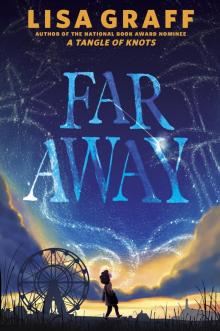 Far Away
Far Away The Life and Crimes of Bernetta Wallflower
The Life and Crimes of Bernetta Wallflower The Great Treehouse War
The Great Treehouse War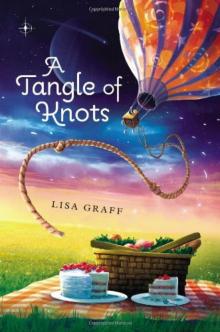 A Tangle of Knots
A Tangle of Knots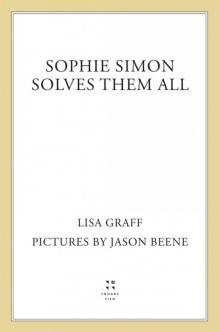 Sophie Simon Solves Them All
Sophie Simon Solves Them All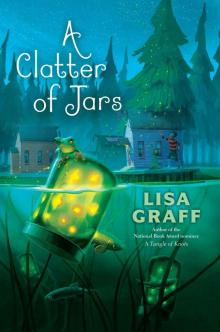 A Clatter of Jars
A Clatter of Jars Double Dog Dare
Double Dog Dare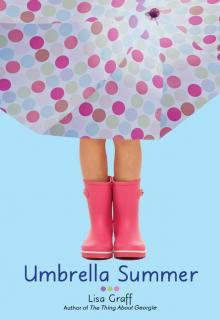 Umbrella Summer
Umbrella Summer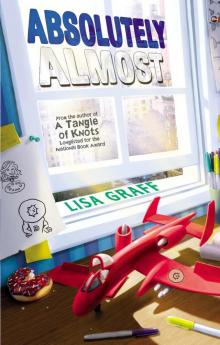 Absolutely Almost
Absolutely Almost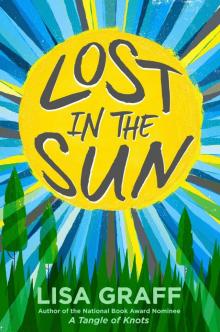 Lost in the Sun
Lost in the Sun